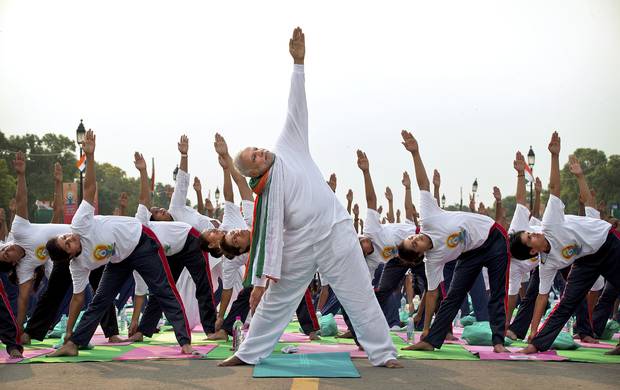In a recent column, Communist Party of India Marxist (CPIM) General Secretary Sitaram Yechury denounced the International Yoga Day as a shallow lifestyle gimmick and an attempt to Hinduise India’s diverse society at the cost of attending to serious problems like poverty.
Though he concedes that yoga might be beneficial to the individual’s health and well being, and nods at its rich history, Mr. Yechury fails to acknowledge that the ethical and philosophical worldview that surrounds the physical aspects of yoga can have profound implications for the sort of problems he lists out. In my view, yoga might one day achieve what Marxism has painfully failed to do despite many struggles and revolutions so far.
Even if it seems commercialized and narcissistic at times, the yoga culture one sees today has not only an individual health and beauty element but a far more promising social-spiritual one. The yoga studios that have appeared in almost every town in America are replete not only with postures and fitness techniques, but also an emerging discourse about what it means to live ethically in a global society coming apart because of inequality, greed, and environmental destruction. Yoga magazines and retreats talk not only about health and peace of mind, but also about issues like sustainability and ending exploitation.
It might be tempting to dismiss all of this as a new-age hippy fantasy, but the fact remains that the globalization of yoga is doing some very good things that secular skeptics in India might not be aware of. My yoga teacher in California, for example, believed in discussing the ethical precepts of yama and niyama a lot more than “bods” and “abs” and such.
It was one thing to have learned about ideals like non-violence and non-covetousness in the much-mocked moral science classes in school, and quite another thing to do so in the context of a deeply fulfilling state of bodily and mental well being in a yoga class. For one thing, in yoga, unlike the classroom, the ethical idea seems not like a fancy idea, but as a living, natural reality that yoga helps us live up to, and to live out too.
In India too, the discourse around yoga in less privileged and westernized social contexts is marked by an emerging critique of the normalized practices of today’s society such as consumerism or junk food. Some of this discourse might sound nativist and nationalist, but that part might well be a response to the entrenched disdain in the Indian elite consensus for things spiritual or Indian, rather than any deep “yogic” antipathy for non yogic lifestyles.
There is already a lot more happening in the yoga world than mere lifestyle indulgence or religious chauvinism. The way forward is to recognize the potential that yoga has today for the rise of a truly global and progressive spiritual-social ethical worldview.
Unlike Marxists who push for political change with little consideration for the language of the soul that animates human desire for action, and unlike the dry moralists of traditional religions who pontificate dogma rather than encourage insight to come from within, the global yogis of today have the possibility of creating something better than what both religion or political ideology have done so far.
For that to happen though, at least one supportive gesture needs to come from the land of yoga’s birth: we need to let the practice and philosophy of yoga rise beyond our often petty calculations about identity-politics and our usual secular-communal clichés. We don’t need to desperately trade in “Oms” and “Surya Namaskaras” for achieving peace and happiness for the individual and the world.
The truth is that yoga has gone global without some imperial, world-dominating Hindu agenda accompanying it. That has always been the greatness of Hindu universalism, that it expresses itself as a universal concern rather than a parochial dogma.
However, there is a risk that trying to de-Hinduize yoga as some secularist critics have done, render it free of its ethical and philosophical underpinnings, will defeat its true potential for social change.
Instead, if those truly concerned about cruelty and indifference to poverty and suffering in the world today, people like Mr. Yechury, could put aside their biases about Hinduism and support an effort to create a universal pedagogy around yoga, something remarkable could happen.
For example, if the Indian government could set up yoga institutes around the world–without the constant fear of stepping on secular toes–there could be a more intellectually focused, and socially progressive direction given to the yoga phenomenon worldwide.
Is it not the worldview of a yogi, after all, that has produced the greatest critique of capitalist modernity, we can think of to this day? If Mahatma Gandhi’s Hind Swaraj, and other similar works, could also be taught and discussed in the space of yoga culture, a better vocabulary for reflection, critique, and social change might emerge than what we have seen so far.
With serious social investment, yoga can easily transcend the risk of becoming a mere individual lifestyle fad or a public display of chauvinistic pride as Mr. Yechury worries.
In America, surya namaskaras have long since replaced revolutionary slogans and gestures. That might not have defeated poverty overnight, but it has at least raised the awareness among practitioners that the spiritual well-being of one is somehow connected to the material well-being of the other. It is a revolution worth pursuing.






























